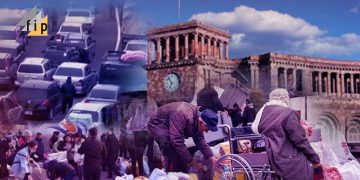During the discussion of the 2019 Report of the Human Rights Defender at the May 12 session of the National Assembly, the deputy of “My Step” faction Vagharshak Hakobyan accused the Ombudsman Arman Tatoyan of applying double standards in his activity. According to the deputy, without making an in-depth assessment, the Defender expresses an attitude with “lightning speed”, defending the opposition partners.
“I tried to re-read your Charter and I did not find a point there that says that when violence is used against a representative of the political majority, you should be silent, there is no such provision in your charter. I consider your report unsatisfactory,” Hakobyan said, meaning the response of the Human Rights Defender following the fight between the deputies of “Bright Armenia” and “My Step” factions, in which the Defender presented rules aimed at “the political majority and each of its representatives who received a mandate of high confidence”.
Earlier, the Ombudsman responded to the argument between NA Vice Speaker Alen Simonyan and Ani Samsonyan, MP of the “Bright Armenia” faction of the National Assembly, noting that insulting a woman by targeting her sex is absolutely unacceptable.
The deputies of “My Step” were outraged at the discussion of the report, noting that when an offensive expression was used against the head of the Civil Aviation Committee Tatevik Revazyan, the Ombudsman did not respond. Arman Tatoyan countered that the position of the Human Rights Defender is for him not to defend the official, but the citizen, in some cases, the opposition. According to Tatoyan, there is an international rule enshrined in the Constitutional Law on the Human Rights Defender, which prohibits government agencies from turning to the Defender.
The Fact Investigation Platform tried to check what functions and powers the Human Rights Defender has, what the Charter is about, who can apply to the Human Rights Defender and who cannot.
What are the functions and powers of the Human Rights Defender?
The functions and powers of the Human Rights Defender are defined both by Article 191 of the Constitution and by a separate constitutional law on the Human Rights Defender.
The first paragraph of Article 191 of the Constitution stipulates that the Human Rights Defender is an independent official who monitors the state and local self-government bodies and officials, and in cases defined by the Law on the Human Rights Defender, also the protection of human rights and freedoms by organizations, promotes the restoration of violated rights and freedoms, the improvement of normative legal acts related to the rights and freedoms. The same is stipulated in Article 2 (1) of the Constitutional Law on the Human Rights Defender.
Chapter 4 of the Constitutional Law on the Human Rights Defender presents in more detail the complaints to be discussed by the Defender, and according to the first paragraph, in the event of any complaint or on his own initiative, the Defender shall discuss violations of human rights and freedoms enshrined in the RA Constitution and laws by state and local self-government bodies and officials, as well as organizations exercising the powers delegated by state and local self-government bodies.
Article 8 of the Constitutional Law on the Human Rights Defender defines the right to apply to the Defender, according to which any person can apply to the Defender. Paragraphs 4 and 5 of Article 8 of the Law stipulate that state and local self-government bodies, with the exception of guardianship and trusteeship bodies, may not file complaints with the Defender.
Previously, the law stated that officials have the right to apply to the Ombudsman only for the protection of their rights and fundamental freedoms as individuals, but this norm has been removed from the law, which assumes that, for example, MPs cannot turn to the Ombudsman.
Ombudsman’s functions in accordance with international rules
According to the Principles for the Protection and Promotion of the Institution of the Ombudsman (Venice Principles) of the European Commission’s Democracy through Law (Venice Commission), the institution of the Ombudsman shall be independent, act against bad governance and alleged violations of human rights and fundamental freedoms that affect individuals and legal entities.
According to the Recommendation of the Committee of Ministers to Member States, the functions of the Ombudsman involve, inter alia, consideration of individual complaints concerning contended errors or other shortcomings on the part of the administrative authorities with a view to enhancing the protection of the individual in his or her dealings with those authorities.
Article 6 (b) of the Rules of Procedure of the Institution of the International Ombudsman stipulates that the Ombudsman shall receive and examine the complaints of individuals against the administrative practice of state institutions.
Thus, we can state that the Human Rights Defender is right when he claims that the constitutional law forbids the state authorities to apply to the Ombudsman, as it is assumed that the authorities have full opportunities to initiate legal proceedings in case of violence against them.
In other words, the Ombudsman is not obliged to protect those who have been affected by the actions of individuals. At the same time, according to Article 6 (1) of the Constitution, like any other official, the Human Rights Defender has the right to perform only those actions for which he is authorized by the Constitution or laws. Therefore, Arman Tatoyan has no right to protect officials, no right to protect persons affected by the actions of individuals, and no right to protect officials affected by individuals’ actions.
Nelli Lazaryan

 FACTOMETER
FACTOMETER










